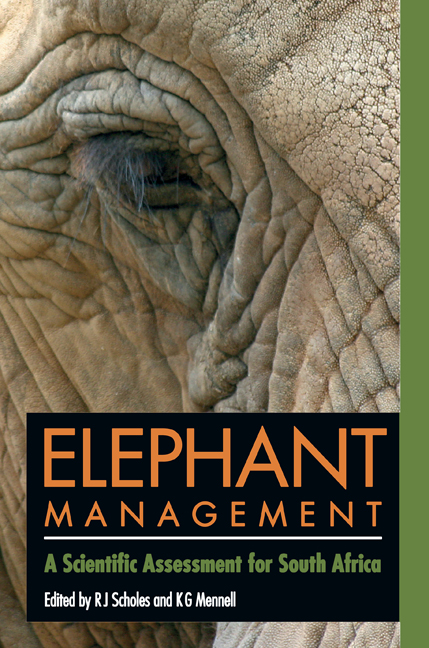Book contents
- Frontmatter
- Foreword
- Contents
- List of figures
- List of tables
- List of boxes
- About the authors and contributors
- List of reviewers
- Acronyms and abbreviations
- Preface
- Summary for policymakers
- Chapter 1 The elephant in South Africa: history and distribution
- Chapter 2 Elephant population biology and ecology
- Chapter 3 Effects of elephants on ecosystems and biodiversity
- Chapter 4 Interactions between elephants and people
- Chapter 5 Elephant translocation
- Chapter 6 Reproductive control of elephants
- Chapter 7 Controlling the distribution of elephants
- Chapter 8 Lethal management of elephants
- Chapter 9 Ethical considerations in elephant management
- Chapter 10 The economic value of elephants
- Chapter 11 National and international law
- Chapter 12 Towards integrated decision making for elephant management
- Glossary
- Index
Chapter 10 - The economic value of elephants
Published online by Cambridge University Press: 04 June 2019
- Frontmatter
- Foreword
- Contents
- List of figures
- List of tables
- List of boxes
- About the authors and contributors
- List of reviewers
- Acronyms and abbreviations
- Preface
- Summary for policymakers
- Chapter 1 The elephant in South Africa: history and distribution
- Chapter 2 Elephant population biology and ecology
- Chapter 3 Effects of elephants on ecosystems and biodiversity
- Chapter 4 Interactions between elephants and people
- Chapter 5 Elephant translocation
- Chapter 6 Reproductive control of elephants
- Chapter 7 Controlling the distribution of elephants
- Chapter 8 Lethal management of elephants
- Chapter 9 Ethical considerations in elephant management
- Chapter 10 The economic value of elephants
- Chapter 11 National and international law
- Chapter 12 Towards integrated decision making for elephant management
- Glossary
- Index
Summary
INTRODUCTION
ELEPHANTS PLAY a huge role within any landscape where they occur. They are habitat engineers. As charismatic species they awaken emotions among people like few others. As keystone species, they contribute significantly to the integrity of ecosystems and must be very carefully managed. From an economic perspective, they are also value generators. In this broad context, we first consider the range of relevant economic values, using the Total Economic Value approach in a generic sense, and then apply this framework to identify the specific factors that determine the economic value of elephants in South Africa. Thereafter we summarise both regional (southern African) and international studies that consider the economic value of elephants. We conclude with an assessment of the state of knowledge on elephants’ contribution to the economic value of elephant-containing ecosystems and the economy as a whole.
This assessment borrows heavily from studies concerning the economic value of elephants carried out in Botswana, Namibia, and Zimbabwe, since similar studies in South Africa could not be located. To date, published studies in South Africa focused either on the cost of the individual elephant management options – which is a subject treated in the relevant management chapters of this book – or else investigations of the value of tourism. The specific contribution of elephants to the value of tourism was not isolated in these studies.
BACKGROUND ON ECONOMIC VALUE
Adam Smith, the ‘father of modern economics’, distinguishes between two types of economic values: exchange values and use values. He clarifies as follows (quoted from reprint in Smith, 1997, 131):
The word VALUE … has two different meanings, and sometimes express the utility of some particular object, and sometimes the power of purchasing other goods which the possession of that object conveys. The one may be called ‘value in use’; the other, ‘value in exchange’. The things which have the greatest value in use have frequently little or no value in exchange; and, on the contrary, those which have the greatest value in exchange have frequently little or no value in use.
He explains the distinction between exchange and use value by referring to the well-known water-diamond paradox. Nothing is more useful than water, yet it has almost no exchange value. In contrast, diamonds have relatively little real use, but have extremely high exchange values. Exchange values are easy to observe.
- Type
- Chapter
- Information
- Elephant ManagementA Scientific Assessment for South Africa, pp. 446 - 476Publisher: Wits University PressPrint publication year: 2008



